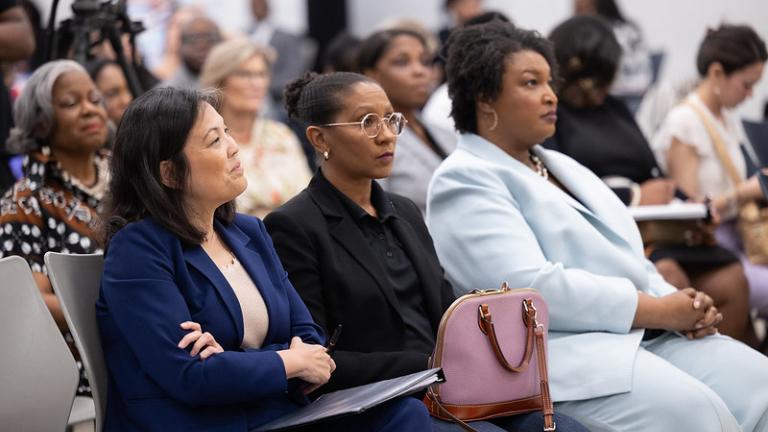United Way Partners Challenge Labor Inequities in Georgia

In Georgia, systemic inequities are as challenging to quality of life and opportunity as economic disparities. In the most recent ALICE report, basic household needs averaged $27,420 annually for a single adult and $61,164 for a family of four. ALICE stands for Asset Limited, Income Constrained, Employed — earning more than the Federal Poverty Level, but not enough to afford the basics where they live, underscoring a significant gap in affordability for many residents. Financial hardship disproportionately impacts communities of color. While 60% of Black and 57% of Hispanic households live below the ALICE Threshold, only 40% of White households face similar challenges. Single-female-headed households with children reported the highest rate of financial strain, with 83% falling below the ALICE Threshold, compared to 66% of single-male-headed and 25% of married-parent households.
Despite some wage increases across common occupations, many workers earn below sustainable levels. Roughly 35% of workers in the most common occupations still lived below the ALICE Threshold, emphasizing the urgent need for access to better-paying, stable jobs to overcome financial instability, particularly for women and people of color.
In light of this, the Department of Labor's (DOL) "Equity in Federal Investments" coalition is committed to ensuring federal investments in the Atlanta airport and the Atlanta Beltline create good union jobs. The coalition launch event saw representatives from the Department of Labor, Georgia State AFL-CIO, the Atlanta-North Georgia Labor Council, United Way of Greater Atlanta, Georgia Stand Up, and other community partners. The spirit of the coalition is closely aligned with United Way's promise to address persistent inequities rooted in historical policies and practices more explicitly.
In her keynote address, Acting Secretary of Labor Julie Su reiterated that the administration's $2 billion infrastructure plan must create good union jobs available to minority workers. "It's important to say that transportation and good jobs have not always been good for communities of color. They've not always been accessible to communities of color. And we are saying not this time, not on our watch."
Meanwhile, Atlanta's Labor commissioner, Stacey Abrams, announced plans to use Department of Energy funding to scale her clean energy home conversion project with Rewiring America. In support of the coalition, the City of Atlanta has also publicly adopted the Department of Labor's Good Job Principles, and labor shared its commitment to recruit from underrepresented populations.
Vice President of Strategic Partnerships from United Way of Greater Atlanta Alvin Glymph re-committed to working with labor and community partners to ensure equitable access to union jobs in the construction sector. "Your message really resonates with United Way—talking about building equity," Glymph said. We are all about cultivating a diverse workforce, this pipeline, and it's all about making sure we are meeting the needs of our community."
Referencing ALICE statistics, Glymph pointed out that "47 percent of our households in Atlanta cannot afford to live where they reside. When you look at this data, this is the group of working poor, and this is who we are here today fighting for." Career Ready ATL, an initiative with organized labor and other community partners, is set up to bring youth apprenticeship opportunities to black, Hispanic, and other marginalized youth. The program is one of the ways that United Way is resisting historical exclusion by bridging educational gaps, dismantling systemic inequities, and alleviating poverty.
Around the world, United Ways are working to ensure that everyone has the chance to thrive regardless of their identity. The Equity in Federal Investments coalition reaffirms United Way's commitment to providing equitable, sustainable opportunities that are available to all. If you are inspired by this work reach out to your local United Way and join us.